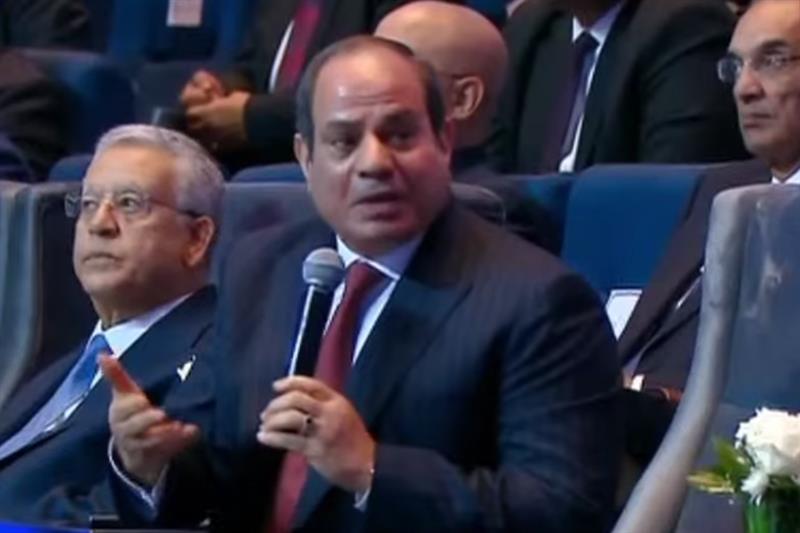
A still photo of President Abdel-Fattah El-Sisi speaking during the opening session of the Egyptian Economic Conference 2022 that kicked off on Sunday in the New Administrative Capital
The president made his remarks during the opening session of the Egyptian Economic Conference 2022 that kicked off on Sunday in the New Administrative Capital.
El-Sisi further explained that at the time “when we defined the maritime borders with Greece and Cyprus in the Mediterranean Sea, we received harsh criticism [locally].”
No company would have agreed to explore for gas without demarcated borders, the president noted.
El-Sisi added that if it were not for Zohr gas field, Egypt would be facing an electricity shortage due to the cost of gas imports, estimated at $10 billion monthly.
Egypt has made a series of oil and gas discoveries in recent years, most notably the giant Zohr gas field off the Mediterranean in 2015, which holds an estimated reservoir of 30 trillion cubic feet of gas. Thanks to the gas field, which started production in December 2017, Egypt achieved self-sufficiency in natural gas since 2018.
“This project [the Zohr gas field] was planned to be operational in 2021 if we went on working with normal rates,” Prime Minister Mostafa Madbouly said, adding, “this means Egypt would have been importing natural gas throughout the last period.”
El-Sisi noted that the Italian multinational oil and gas company Eni said in 2015 that Zohr would start production in five years and he told them “only in 18 months” and “we did it thanks to God.”
In September 2021, the Cabinet’s Information and Decision Support Centre (IDSC) said in a report that Egypt has seen an unprecedented leap in its natural gas export revenues, which have increased 13-fold over the past eight years.
Egypt’s natural gas and liquified natural gas (LNG) export revenues reached $8 billion in the fiscal year 2021/2022, up from $0.6 billion in 2013/2014, according to the report.
Egypt has quadrupled its exports of LNG and natural gas over the past eight years from 1.9 million tons to 7.2 million tons, the IDSC said.
Egypt’s petroleum exports have witnessed a giant leap recently, with Madbouly saying on Sunday that they increased by 109 percent in 2021/22 compared to the previous year with revenues estimated at $18 billion up from $8.6 billion.
Egypt plans to use its position on Europe’s doorstep to become a major supplier of liquefied natural gas (LNG) to the continent, which is transitioning away from other fossil fuels.
Egypt now ranks fifth in the region in natural gas production by volume, with 58.5 billion cubic metres yearly, according to Madbouly.
Egypt also has the infrastructure for transporting and handling natural gas with a network of 7,000 kilometres of pipelines, a distribution network of 31,000 kilometres, and 29 gas-treatment plants as well as two LNG facilities – Idku and Damietta plants.
This comes in light of European countries' desire to diversify their energy sources in order to decrease dependency on Russian gas, which accounted for 45 percent of European imports in 2021, according to the International Energy Agency (IEA).
According to a plan announced in August, Egypt seeks to save 15 percent in local natural gas used for electricity generation in order to increase exports that can bring much needed foreign currency.
Madbouly said in previous statements that saving 10 percent of natural gas used for electricity production and redirecting it for export will bring in approximately $300 million per month, while saving 15 percent will bring in $450 million per month.
Short link: